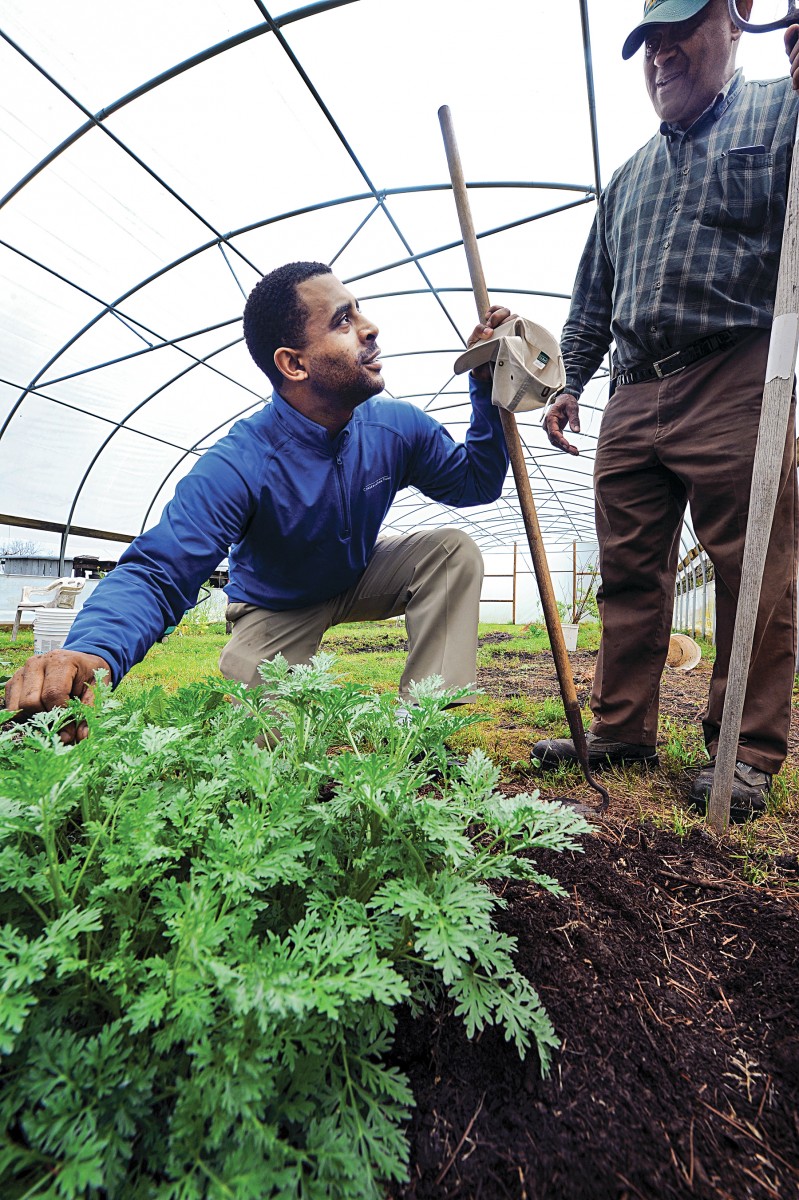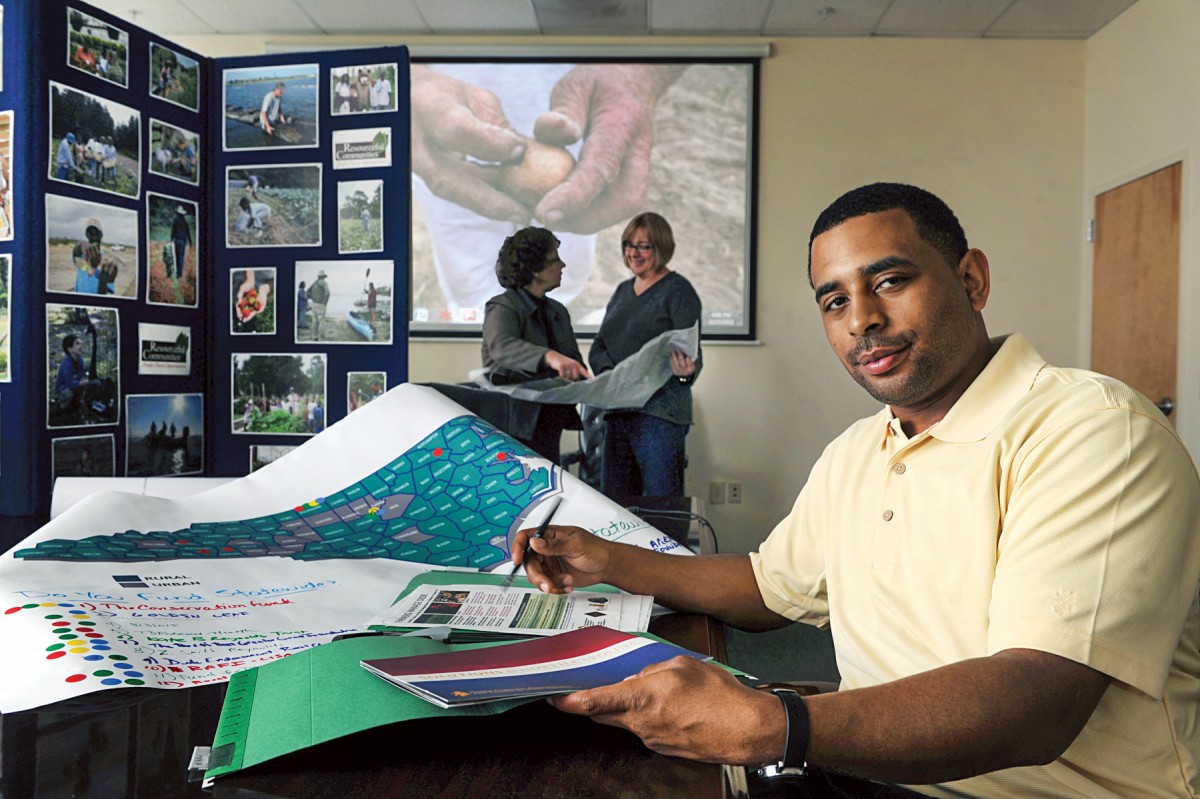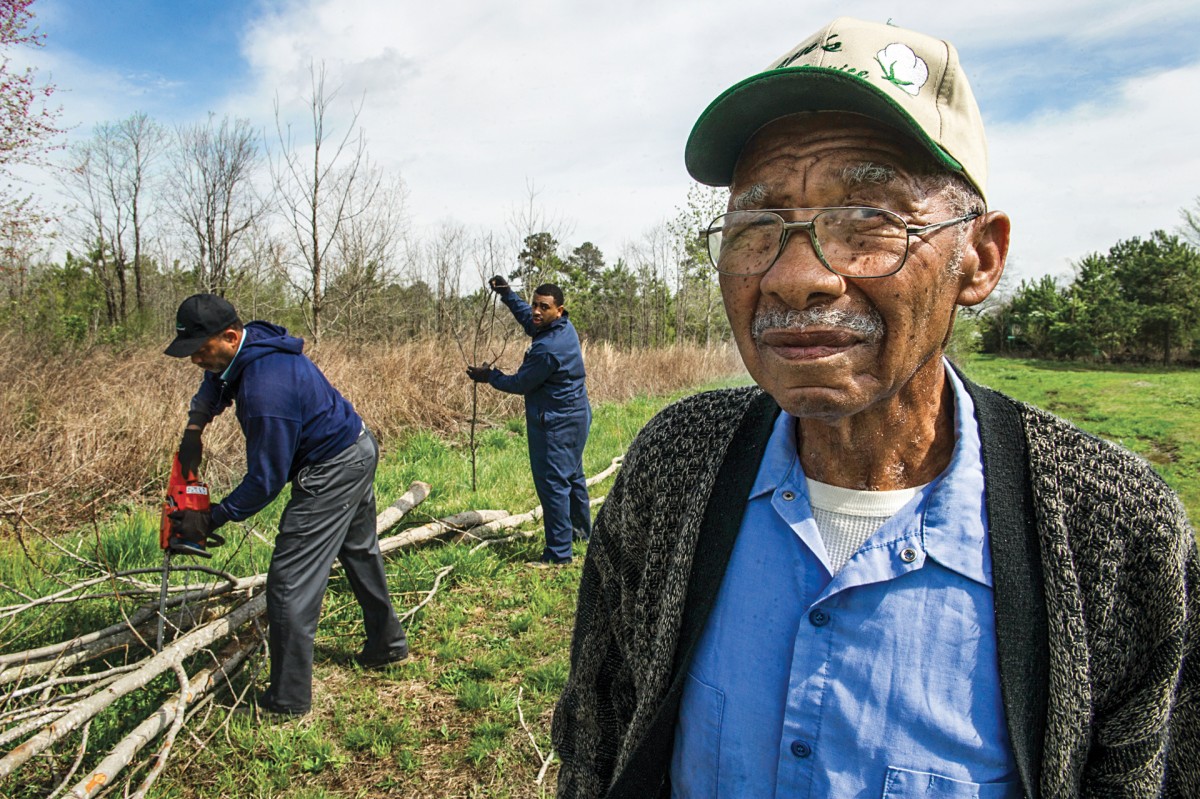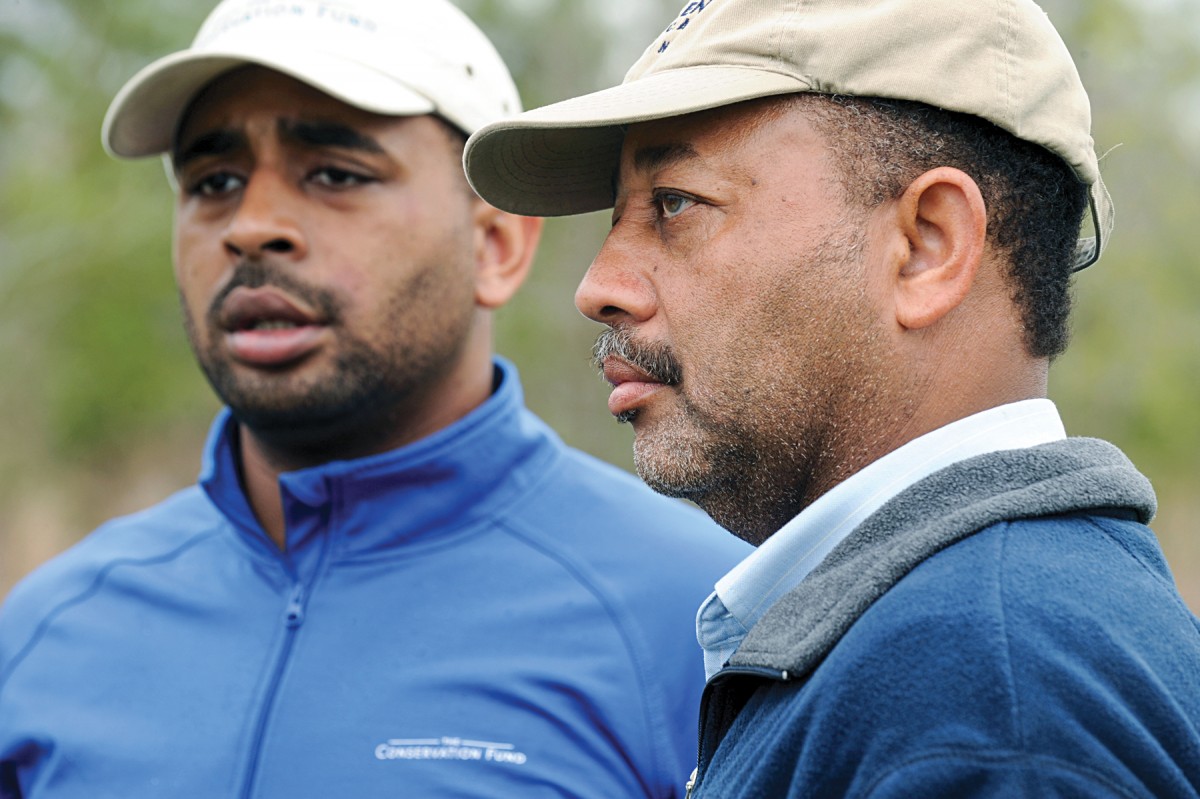Breaking Ground

Julius Tillery ’08 longs to write a new formula for success in his rural homeland: Come back and make the farm work like it never has before.
by Mary E. Miller
His first memories are of sitting on his father’s lap on the tractor, bouncing along the long, straight lines.
Today, he commutes between a weekday desk job in Chapel Hill and that tractor seat in Northampton County at the week’s end.
As a young African-American Carolina graduate tilling the soil of eastern North Carolina, he is, he likes to say, “as common as a chicken with teeth.”
And this is what bothers him: “As a little kid here, when you start to make A’s, they will talk with you about becoming a doctor, or a lawyer or even a teacher. But nobody — nobody! — will ever mention the possibility of becoming a farmer.”
Up in Northampton and Halifax counties, along the Virginia line, close by I-95 but not a destination, the definition of success for a young person is getting out. Julius Tillery ’08 keeps coming back to the timeless uncertainty of farming and the timeless optimism of farmers.
But these days it’s not so much the love of the past that brings him back as it is the possibilities for those willing to think differently about what they do with the land.
When he stood in front of a Future Farmers of America class and asked for a definition of the phrase “local food,” not one arm reached up. Most of the poorer people up here, Tillery says, shop at the Dollar General. Their families scrape by farming row crops such as tobacco, cotton and soybeans, subsisting on a diet of canned and processed foods.
In one of the poorest counties in the state, Tillery is trying to cultivate a vision that could change the way people in his area farm and eat. He’s also trying to make something grow that is as critically needed as fresh produce: jobs.
“Look, the people where I come from have been poor forever,” said Tillery, a fifth-generation farmer. “It doesn’t have to be that way. We are land rich. We can grow different commodities that will feed our people and bring in 10 or 15 times what cotton and soybean crops make.”

Julius Tillery with John Dockery, who will grow Asian vegetable varieties for the farmers market. (Photo by Donn Young)
The recession hit hard in the town of Garysburg, closing businesses, including chain grocery stores in nearby towns. Residents were left 20 miles from a source of fresh fruits and vegetables. A vacant elementary school looked like an opportunity to Tillery: a ready headquarters for a food hub, where local produce could be sold and distributed; where selling, cleaning, prepping, packaging, marketing and shipping of produce could create jobs; where farmers could gather to learn more about conservation, diversification and other ways to maximize the yield of their labors.
“This idea is still in its infancy — we are figuring out how to make it happen,” says Diane Gallimore, Garysburg’s town administrator. “It was Mr. Tillery’s vision. He certainly wants to help farmers and cares about his community.”
Agriculture and education
Tillery’s great-grandfather, for whom he is named, and his grandmother are buried 20 paces from the steps of his grandfather’s house, in between the barn, house and garden.
His grandfather, James Tillery Sr., is 90 and left home only once, to serve in World War II. He still runs his farm and casts final say on the decisions.
James Tillery Jr. and Stephanie Tillery did venture out — both Julius’ parents graduated from N.C. A&T University. His 54-year-old father, whom he calls “The Man,” is a former high school agriculture teacher and elementary school principal who now works as the head of transportation and facilities for the Northampton public schools. His mother holds three master’s degrees and is an assistant principal.
James didn’t imagine his son would go into farming. Julius was an athlete, playing football, basketball and baseball. (“Farming,” Julius says, “makes you strong.”) But somewhere in middle school, he started trailing along with his father to Future Farmers of America high school field trips and attended some ag-related summer camps at A&T.
“J,” as he is known at home, excelled in school, making straight A’s through middle school. He played piano, sang in the choir and started his own business cleaning classrooms — he subcontracted work to friends. He was approached to apply to the School of Science and Math in Durham, the state’s elite boarding high school. Every Tillery understood he had to go.
“You could say we are a 50-50 family of agriculture and education,” jokes James Tillery. “We knew he would have so many more opportunities if he left.”
The young Tillery started college with visions of studying computer science and planting himself in Silicon Valley. He started taking business classes.

Julius Tillery is farm resources coordinator for the Conservation Fund of North Carolina, where he builds bridges between farmers and experts in marketing, public policy and economic development. (Photo by Donn Young)
Along the way to his economics degree and his entrepreneurship minor, Tillery got to know Jim Johnson, the business professor and dynamic director of UNC’s Urban Investment Strategies Center. Johnson grew up on a tobacco farm, and he understands the demographics of rural North Carolina as well as anyone.
The social entrepreneurism class where they met was where Tillery realized that he was a farmer, that he wanted to be a farmer — and that he could improve farming, making a business career out of teaching other farmers to grow more efficiently. Johnson remembers Tillery had a well-developed sense of passion and identity.
“Julius is actually a part of a movement of African-Americans who are trying to develop a sustainable food system for their communities,” Johnson said. “What he’s doing will only enhance North Carolina as a place to do business. It’s not trivial stuff.”
Now 28, Tillery is farm resources coordinator for the Conservation Fund of North Carolina, where he helps minority owners of small farms and the people of rural communities across eastern North Carolina make farming a more efficient, environmentally safe and lucrative business.
He creates planting templates for farmers trying to diversify their crops and informs others about the inclusion of certain crop insurance allowances on the latest federal farm bill. He builds relationships and bridges between farmers and university researchers, people who own small businesses and experts in marketing, public policy and economic development.
Tillery joined the group in 2013, after spending nearly three years working as a field coordinator for Rural Foundation Advancement International. It is a new position, focusing on minority and small-scale farmers, says Mikki Sager, the director of Resourceful Communities and vice president of the Conservation Fund.
“Julius is sort of the next generation” of farmers and farmer advocates, Sager said. “Not a lot of people have yet come to the place where they have seen the needs for the kinds of connections he is making, the barriers he is overcoming and the opportunities he is seizing.”
Dreams and doubts
Almost every weekend from April planting through October harvest, Tillery leaves his Chapel Hill condo for a 90-minute drive back home to join his father and grandfather tending soybeans and cotton on 150 of their family’s 400 acres.
Just past his grandfather’s front steps is one acre of tomatoes, cantaloupes and peppers. The youngest Tillery has convinced his elders to plant these in the hope of sowing a better future for a struggling rural community. The produce grown on that patch could help supply the food hub.
Home always has been a hard place for Tillery to leave. But on some days it is even harder to come back.
In March, when ice lingered over muddy fields, Tillery spoke to a middle-school class of FFA students in Halifax County about local foods and later met with farmers to get their buy-in to grow crops in Northampton for the farmers market he hopes will get started this fall. Even pulling together food for the meeting required enlisting his mother, father — and his grandmother’s homemade Honeybun cake — and a whole lot of driving.
Driving past miles of fields on his way to Garysburg, he sighed. “I know it doesn’t look like much, but I look at all this land and say, ‘Why can’t we be a Smithfield? A Clayton?’ It is a matter of growing more, and more efficiently.”

James Tillery Sr.’s face reflects the skepticism that greeted Julius’ idea to grow shiitake mushrooms, as James Jr. and Julius cut logs to inoculate the mushrooms. They made a small profit in the second year. (Photo by Donn Young)
Among North Carolina counties, Northampton ranks second in cotton production and 13th for soybeans. Its 22,000 residents are mostly poor and not highly educated. There are some 340 farms, and the average size, at 458 acres in 2012, is much larger than the state average of 170 acres. More than 95 percent of that land is used to grow cotton or soybeans. Cotton brings in an average of $700 per acre. Green bell peppers: $10,000. Strawberries: $15,000. Even cabbage brings nearly $5,000.
“I’m not saying to stop growing cotton and soybeans, but to use some acres to grow vegetables and fruits,” he said.
The optimist and economist within him often do battle. Minority farmers are the least educated group, he says. Change does not come easily for them. Doubts about the progress toward a food hub plague him, he admits.
“I understand the numbers.”
When he needs to think, he heads to Bynum Farm, his own 70 acres where he farms cotton and hunts deer and rabbit. He pulls the car into the middle of the field, and as soon as his feet touch dirt, Tillery lets out a loud, happy whoop. His best ideas seem to grow in this field.
A few years ago, his father and grandfather thought he was crazy when he attended a workshop on growing shiitake mushrooms and proposed adding them to the soybeans and cotton they grew. But at $15 a pound or better, who could argue? Finally, he pleaded with them, “I can show you better than I can tell you.” He and a cousin together invested $1,000.
The first season was a disaster. The mushrooms died, and the cousins lost their money. Tillery wouldn’t give up. Over the winter, he also found a restaurant in Virginia looking for a local source. The next year, they turned a slight profit. This year, he and his father cut 100 logs to inoculate for growing mushrooms.
“He has captured my imagination,” his father said.
Small victories
It may have been Tillery’s presentation that March day, or the Honeybun cake. Seven farmers agreed to grow a variety of vegetables for the food hub, enough to plan for its opening this summer.
“Change is hard for farmers,” James Tillery said. “A lot of times, Julius is talking to older groups. … But when you bring solid facts to the table and you start talking about changing the economics for people, they’ll start listening.”
The Kenan-Flagler Business School is where Tillery returned to see if the hub truly could work in Northampton County. He commissioned a feasibility study through NCGrowth, a division of the Frank Hawkins Kenan Institute of Private Enterprise. It made a strong case for Tillery’s idea.

Father and son contemplate a different future for farmers. (Photo by Donn Young)
What he represents, and what Tillery is trying to propagate across North Carolina, is a new breed of farmer — a small-business owner who is tech savvy and entrepreneurial, who understands and uses marketing, networking and public policy, and who grows and sells locally.
A nonprofit group that oversees economic development projects in languishing communities has entered into an agreement with the town of Garysburg to manage the creation of a food hub. With the cooperation of the Conservation Fund, Tillery helped the town submit grant applications to the U.S. Department of Agriculture and to regional businesses for the initial rounds of funding. Eventually it will have to become self-sustaining.
Already there are small victories, things Tillery turns over in his mind late at night. A farmer in neighboring Edgecombe County constructed hoop houses and planted early tomatoes in April to be available for sale by July or early August. Tillery’s father and cousins uttered not a skeptical word as they cut wood for shiitake mushrooms. His presence in Garysburg has spurred more change in the past year than in all the time since the school closed in 2009.
Tillery agreed with a woman at a recent conference who said the modern-day small farmer really needs to be a genius.
“A farmer has to know science, chemistry, technology, weather, business trends, marketing, social media … so much.”
He was just elected vice president of the Future Leaders of Conservation advisory board, and he’s a member of the Farm Bureau’s Young Farmer and Rancher Program. His ideas are getting attention, and sometimes, that is enough.
As farming’s future in places like Northampton County shift into the hands of his generation, for Julius Tillery going back home is the only road forward.
Mary E. Miller is a freelance writer based in Raleigh.
